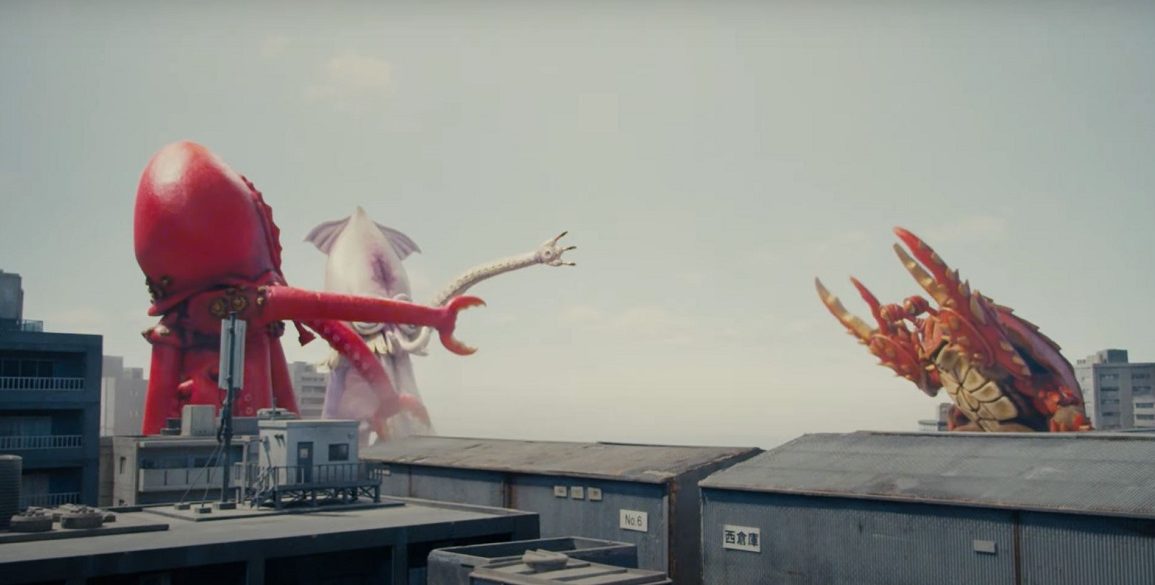From the second an extremely goofy and animated credit sequence begins, you know that Monster Seafood Wars will be a treat. One hellbent on entertaining anyone and everyone and possibly even breaking or melting a few brains the process. It’s a feat the film takes seriously, launching immediately into a 90 minute roller coaster. One that may hit a few bumps along the way, but just adds an extra flavor to everything. To put it simply, director Kawasaki Minoru turns in the cuddliest and goofiest kaiju and tokusatsu film you’re likely to see all year.
Yuta (Keisuke Ueda) is making his yearly teave a sushi offering. Suddenly, while riding his bike, a passerby punches him in the arm. This may seem rather innocuous, but seconds later the city is besieged by a gigantic octopus & squid. Coincidence? In a short period of time, the government unit S.M.A.T. (Seafood Monster Attack Team) are trying to clean up the mess and figure out the lasting effect of a drug called Setap Z, that’s the cause to their enormity. Recruited to the team by its leader and scientist Nana (Ayano Christie Yoshida), a former crush of Yuta’s, time time to save the day. If he can stop clashing with hot-shot rival Hikoma (Yuya Asato), that is.
The moment a scientist utters “there’s nothing more effective against seafood monsters, than rice vinegar,” you know exactly what you’ve signed up for. This strange beast is very much an area Kawasaki has cornered. Those familiar with his work will feel right at home. For while the last 20 years have definitely seen a rise in films moderately similar in tone to Monster Seafood Wars, it usually spills over into the splatter-fest zone. Kawasaki exists in a more sanitized or chaste variation. There’s little here that would keep anyone from recommending it to somewhat younger audience, as the majority of questionable jokes would soar over their head.
Many of the flourishes in the film are initially presented as oddities. The interstitial framework, for example, comes off as a little disjointed. A news report, reports on the tragic kaiju attack from 3 years prior. Talking heads interviews go into great detail concerning certain events, only then for the film to jump to said point in time. It’s not presented as recreation, but just a regular old flashback. Like the rest of Monster Seafood Wars, the more the cutaways occur, the funnier it gets.
On a whole, the unwieldy humor is what makes this film special. Continually, little jokes form out of nothing and then are followed well past their zenith. Halfway through, there’s a monster meat tangent that keeps going and going, with seemingly no end in sight. At first it’s annoying. Then, as it keeps trudging along, it becomes transcendentally ridiculous and joyous. It’s the most pure cinematic example of “going along for the ride.”
This isn’t a small thing, mind you, as the monster meat aside becomes a relevant plot point. Both in terms of character motivation and weird vignettes. The subplot threatens to entirely take over the second and third acts. What starts as a quaint dream for one character to eradicate world hunger, unexpectedly produces, among other things, a quasi-black market of goods. The further down the rabbit hole thing go, the weirder and more wonderful it becomes. The various digressions allow Kawasaki to dig his heels in and get rather wild. A calling card that’s worked for him previously in Executive Koala and The Calamari Wrestler. Like those films, Monster Seafood Wars delights in by embracing the absurd and trying to fuse a story onto it.
There’s a very goofy and affable jauntiness to the overall product, that helps scenes naturally glide by. That pace and tone allows things never to feel bigger down. As long as you’re the kind of person who can buy into the standard Kaiju guidelines. Thought it doesn’t bare the name, this film is cut from the same cloth as Godzilla, Mothra and Roman, highlighting their strengths and weaknesses. Large sectionals of the film are dedicated to the human component. Namely the strange love triangle between Yuta, Nana and Hikoma. In a film that lampoons virtually everything, it’s played a bit too straight.
Monster Seafood Wars is a very particular film. Everything has been planned to the “nth” degree. Down to even the silliest of moments. It may seem trite, cheesy and predictable, but that’s the point. This bleeds over to the kaiju action. Classically engaging in “men-in-rubber” suit battles is glorious, heightening the old school charm. Explosions reign down as the monsters stomp about, often knocking each other over casually. Merely often, as the long spindely arms can only do so much damage. Yet they look so cute, it doesn’t really matter.
Like more traditional kaiju films, the destruction and battles are short, stitched throughout the narrative. For some, they might not go on for long enough. That’s the biggest thing people collectively glaze over, when it comes to kaiju movies, from the distant past. Many of the films that had Godzilla‘s name in the title, in actuality only showcased him in about 10-15 minutes of screentime. So, by adhering rather close to the necessary tropes, the same happens here. All it does it add to the theatrically of it all, making the whole product that much more enjoyable.
Monster Seafood Wars is a delectable, tasty and exceedingly cheesy time. The simplicity on display, even in the face of a loving spoof, might wear thin after a while. Yet the confidence and joy with which everything is presented, brushes over some of the smaller misgivings. It’s hard to get mad at a production where the end credits song involved a choir of people shouting “Kaiju War!” For those in desperate need of a quick distraction, that will likely leave a giant smile plastered on your face, look no further.




